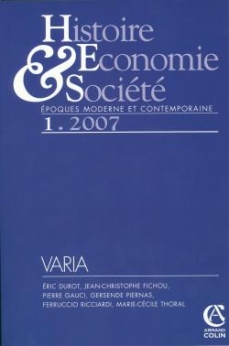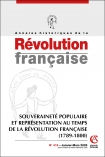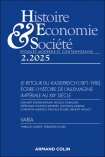
Histoire, économie & société (1/2007)
Numéro épuisé
Recevez les numéros de l'année en cours et accédez à l'intégralité des articles en ligne.
Cet article analyse l’échec de la démocratie industrielle en Italie dans l’immédiat après-guerre (1945-1951) à partir de l’expérience du conseil de gestion des usines Alfa Romeo de Milan. Organisme issu de la politique fasciste de socialisation, le conseil de gestion est transformé par une volonté commune aux principaux partis politiques italiens (notamment les communistes et les socialistes) en instrument visant à l’implication accrue des travailleurs dans la gestion des entreprises. Ses prérogatives se résument dans des fonctions de consultation et d’expertise sur des sujets concernant l’organisation de la production et du travail. Dans le climat consensuel qui caractérise la Reconstruction, il constitue une amorce de coopération interprofessionnelle (y participent ingénieurs, cadres de production, ouvriers qualifiés…) et de dialogue avec la direction, avant de devenir un lieu de conflit syndical dans le cadre d’une détérioration progressive des relations entre les partenaires sociaux. L’exemple du conseil de gestion chez Alfa Romeo montre comment les tensions internes, pas seulement de nature politique, ont contribué à la transformation d’un instrument destiné à stabiliser les relations d’usine en un agent de ces mêmes tensions. L’éclatement du compromis qui était à la base du fonctionnement du conseil de gestion va de pair avec des changements techniques (le passage à la production en série) et organisationnels (l’arrivée d’un nouveau management) qui s’inscrivent dans une stratégie de rationalisation des activités de l’entreprise automobile italienne.
This article analyzes the failure of Italian industrial democracy in the immediate post-war years (1945-1951) by examining the experience of the Alfa Romeo (Milan) work council. A creation of fascist socialization policy, the work council was transformed after agreement between Italy’s principal political parties (in particular, socialists and communists) into an instrument intended to increase workers involvement in the business’ management. Its duties consisted of supplying advice and expertise concerning the organization of labor and production. In the climate of reconstructionera consensus, the work council initially represented a pivot of inter-professional cooperation (engineers, production managers and skilled workers all participated) and dialogue with ownership before later becoming a site of union conflict as relations between social partners progressively deteriorated. The example of the Alfa Romeo work council shows how internal tensions, not always political in character, contributed to the transformation of an instrument intended to stabilize factory relations into a cause of these very tensions. The collapse of the compromise upon which the work council was founded went hand in hand with technical (the advent of assembly line production) and organizational (the arrival of new management) changes that, taken together, constituted a strategy for rationalizing the activities of the Italian automobile enterprise.

